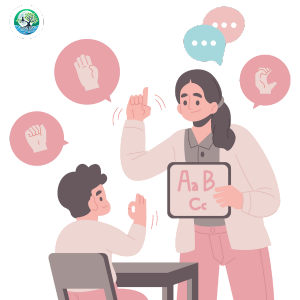
Dr Sathiya Ganesan’s
Every child’s voice deserves to be heard — and every word carries a world of possibilities.
Communication is the foundation of human connection. When children struggle with speech or language development, it can affect their academic performance, emotional well-being, and social relationships. Early and compassionate support can transform these challenges into triumphs.
At Dr. Sathiya Ganesan’s Child and Adolescent Psychiatry Centre, we provide specialised, holistic care to help children find their voices and confidence.
Understanding Communication Disorders
Every Word Matters. Every Voice Deserves to Shine.

Communication Disorders refer to difficulties in speech production, language understanding, verbal expression, or social communication. They include a range of conditions such as:
- Speech Sound Disorders (difficulty articulating sounds correctly)
- Language Disorders (problems with understanding or using words and sentences)
- Fluency Disorders (stuttering or interruptions in the flow of speech)
- Voice Disorders (problems with pitch, volume, or quality of the voice)
- Social (Pragmatic) Communication Disorder (difficulty using language appropriately in social situations)
Each child’s communication profile is unique, and with the right intervention, significant improvements are possible.
Common Signs of Communication Disorders
Children with communication challenges may:
- Delay speaking first words or forming sentences
- Mispronounce words consistently
- Struggle to understand instructions or follow conversations
- Show frustration when trying to express needs
- Speak with a stutter or uneven speech flow
- Use language in ways that seem inappropriate to the situation
- Avoid speaking in social situations
Early recognition and support are key to building a strong communication foundation.
Unlocking Voices: Our Comprehensive Communication Care Approach
Comprehensive, Child-Centered Evaluation
A thorough and sensitive evaluation is the first step. Dr. Sathiya Ganesan collaborates with experienced speech-language pathologists to conduct standardized language tests, speech articulation assessments, social communication evaluations, and detailed developmental histories. We focus on identifying each child’s strengths and challenges across multiple domains of communication.
Guiding Families with Knowledge and Heart
Parents are essential partners in a child’s communication journey. Dr. Sathiya Ganesan provides clear education about the specific disorder, realistic expectations, and home strategies to enhance language development. Empowering families to support everyday communication builds confidence and success outside therapy sessions.
Unlocking Voices: Our Comprehensive Communication Care Approach
Our specialized interventions include:
- Speech Therapy for articulation, pronunciation, and fluency
- Language Therapy for vocabulary building, sentence formation, and comprehension
- Social Communication Training for pragmatic language use
- Fluency Shaping and Stuttering Modification Techniques
- Voice Therapy for pitch, volume, and vocal health
- Parent-Led Home Programs to extend progress beyond sessions
Therapies are individualized, goal-oriented, and focused on real-life application — helping children express themselves confidently and clearly.
Thoughtful Medication Management When Needed
In cases where communication difficulties are secondary to conditions like Autism, ADHD, or anxiety, Dr. Sathiya Ganesan considers careful medication support to address associated symptoms — but speech-language disorders themselves are primarily treated with therapy, not medications.
Building Communication-Friendly Environments
A child’s environment plays a vital role in language development. We guide families and educators in creating rich, responsive environments that encourage talking, listening, reading, and emotional expression. Simple daily interactions are powerful tools for communication growth.
Integrated Care for Associated Emotional and Developmental Challenges
Many children with communication disorders also experience challenges such as learning disabilities, ADHD, Autism Spectrum Disorder, or social anxiety. Our integrated care model ensures that emotional, behavioral, and developmental needs are addressed alongside speech and language growth.
Key Highlights of Our Communication Disorders Care
At Dr. Sathiya Ganesan’s Centre, we offer:
- Accurate, In-Depth Diagnostic Assessments
- Customized Speech and Language Therapy Programs
- Family-Centered Training and Empowerment
- Integration of Social Skills and Emotional Development
- Collaboration with Schools, Therapists, and Pediatricians
- Long-Term Support to Build Confident Communicators
We believe every child has a voice — and we are committed to helping them share it with the world.

Why Choose Dr. Sathiya Ganesan?
- Specialized Expertise in Neurodevelopmental and Communication Disorders
- Individualized, Child-Friendly Therapy Approaches
- Strong Emphasis on Holistic Growth — Academic, Emotional, Social
- Family Involvement and Empowerment at Every Step
- Commitment to Building Lifelong Communication Skills
Ready to Begin the Healing Journey?
Every child deserves the joy of being heard and understood. With early intervention, specialized therapies, and a nurturing approach, children with communication disorders can build powerful skills that last a lifetime. At Dr. Sathiya Ganesan’s Child and Adolescent Psychiatry Center, we are honored to walk beside families on this empowering journey — unlocking voices, building futures.
At what age can Communication Disorders be diagnosed?
Communication challenges can be observed as early as 18–24 months if a child is not meeting expected language milestones. Early diagnosis leads to better outcomes.
Are all speech delays a sign of a disorder?
Not necessarily. Some children are “late talkers” but catch up naturally. However, significant delays or difficulties warrant evaluation to rule out underlying disorders.
What is the difference between Speech and Language Disorders?
Speech Disorders affect how sounds are produced. Language Disorders affect understanding, forming sentences, or using language meaningfully.
Is stuttering curable?
Early intervention can greatly reduce stuttering. Many children outgrow it with appropriate therapy, though some may require ongoing support.
Can Communication Disorders improve without therapy?
Some mild cases improve naturally, but targeted speech-language therapy greatly accelerates progress and prevents academic and social difficulties.
How can parents support speech and language development at home?
Talking frequently, reading aloud, expanding on a child’s words, encouraging turn-taking in conversations, and celebrating every communication attempt are powerful tools.


